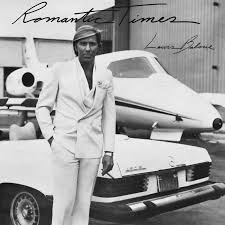
I mustn’t believe it – it can’t be true, it’s seems too convenient – a second record? But a mysterious world is a better world so I will believe in Lewis. His hair is longer, he’s wearing clothes and he’s discovered rhythm but it is him. To all those crouched behind their keyboards muttering ‘hoax’ and pounding out sneers, this record – this second record from the elusive, reclusive ‘lost’ artist Lewis, was surely evidence of conspiracy. Fancy that, they say, after the whirlwind success of L’Amour, just as the hipsters of the world were canonizing their mystery man as a saint of sorrow – another recording surfaced in Alberta. It seethes with the same moonlit melancholy and bubbles over with lush synths and spaced out falsetto weeping. It’s all so trendy, it’s just all so damned convenient.
They’ve found him now, I hear – he’s alive in Canada where until recently he lived unaware of his fame. He refused the royalties offered by Light in the Attic records, he drinks tea in the sun and still wears white. Lewis may no longer be a ghost, but listening to his second LP, I find that hard to accept.
Romantic Times is the second offering from Canadian singer-songwriter Randall Wulff, formally known as Lewis and referred to here as Lewis Baloue. And it is a blue record indeed, as blue as the bruised night sky. A David Lynch comparison is absolutely inevitable upon listening to this record. Not only for the Badalamenti-esque synth swells and gentle falling guitar but for the grotesquerie Lewis is capable of. Much like Lynch’s obsession with the secret corruption beneath the veneer of the idyllic, on Romantic Times the recognizable, the cliche – the very fabric of pop’s mythology is interwoven with a hallucinatory madness. Lewis is the crooner in the unlit corner of a forgotten bar where cowboys waltz in ever diminishing circles and the highway leads only deeper into the night. It is familiar, yet deeply unsettling: a worm in the heart of the fruit. The album opener is Strangers in the Night heard through a dream, re-titled as We Danced all Night and sounding as though the singer sings to keep the morning away.
Excepting a few moments, the songs are synthscapes propped up by programmed drum beats and draped in the melting wax of Lewis’ narcotic voice, his vibrating falsetto flying up to the rafters like an overly medicated Bryan Ferry. There is a saxophone crying somewhere in the dark as well. Romantic Times is a haze, a fog wherein a man is lost and he moans to himself, counting his heartaches on his fingers.
https://www.youtube.com/embed/v1Goqn0WXNc“>
Recent Comments